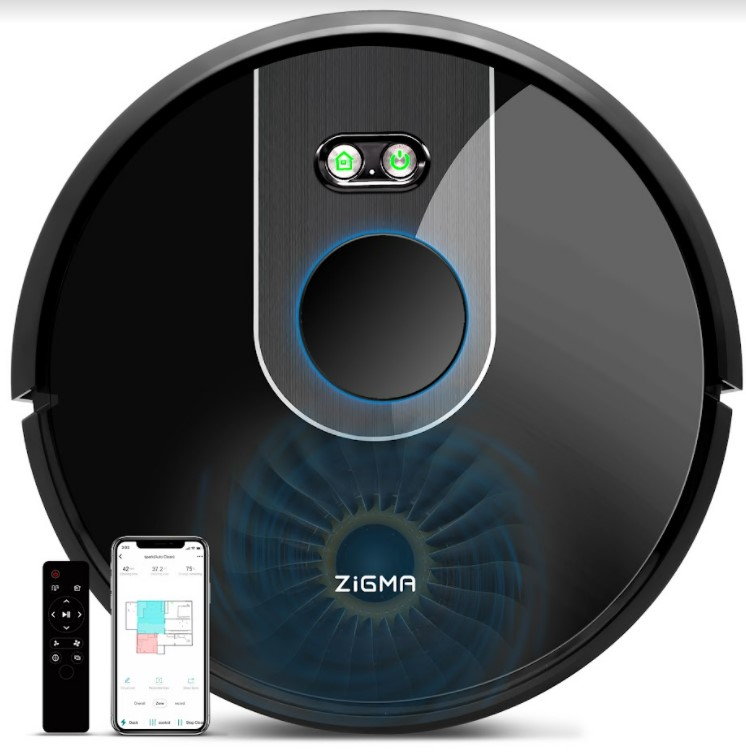The Zigma Spark 980 does not come with an auto-empty station. Rather it has a 600ml onboard dust bin and HEPA filter to minimise dust particles – large enough for several days cleaning of carpet and hard flooring before it needs to be recharged. Inside the box, there is the robot and charging base with a power adapter. There is a dustbin, a combined dustbin/water tank and two HEPA filters. There is also spare side brushes, a cleaning tool and remote control – but no batteries. There is also a spare mopping pad and a user guide. This robot has 4000Pa suction power, which is very loud when configured to sweep at its maximum suction. This power can be reduced if you only have hard flooring – but 4000Pa certainly ensures that carpets get the best clean possible. Set the suction power to the midpoint; then, when the robot vacuum encounters carpet, the fan will auto-boost to maximum suction. Unfortunately, running the robot at maximum power will significantly reduce the battery life of the robot vacuum below its advertised run time of 140 minutes. At maximum power, the robot will return to its dock after about 45 minutes. However, when the Spark 980 detects that its battery is low, it will return to its charging point to recharge its 3,200mAh battery before returning to the last place it cleaned to finish its task. Its voice announcements are clear and loud – the English voice is crisp, clear, with a fun upper-class tones. The Zigma Spark 980 also comes with a separate 360ml water tank and mop pad which looks like it has an integrated dust bin included - but this structure is to provide strength to the water tank. You can also add floor cleaning detergent to the water tank – unusual in robot vacuums – so that the mop pad will clean the floor as well as wipe with a damp cloth. The Spark 980 will not sweep and mop the floor at the same time. You must remove the dustbin and add the water tank, to mop the area. Be aware, though, that the robot has no protection plate on its charging base. If you have a porous wooden floor or a floor that could be damaged by dampness, make sure that you remove the mop pad each time the robot returns to its base. The mop will not clean itself after mopping, so after each clean, the mop pad needs to be removed and rinsed before replacing the mop pad. In use, the Spark 980 does not follow a structured path. It uses a Y-shaped cleaning path to cover extra areas when it is travelling on its path. Its obstacle avoidance is reasonable, but I would not dare to leave a glass of wine or cup of coffee on the floor. These would definitely be knocked over as the robot moved. Some robots have a much finer approach to obstacle avoidance and would avoid the cup or glass completely moving around it at a distance. The Zigma app is simple to connect to the robot vacuum and has some nice features. Mapping is accurate, and you can rename rooms and areas in your space. The app will save multiple versions of maps for multi-floor mapping. Setting no-go areas is simple, and the robot will either clean rooms or the entire space. You can also use your voice assistant to control the robot. I think that including the weather, humidity, and air quality is overkill. However, this is one function that I can not work out why it would be needed in a robot vacuum. The biggest issue I had with the app was to set the automation so that the robot would clean multiple times each day. Setting the schedule to sweep or mop each day seemed overly complex. However, once set, everything worked really well.
